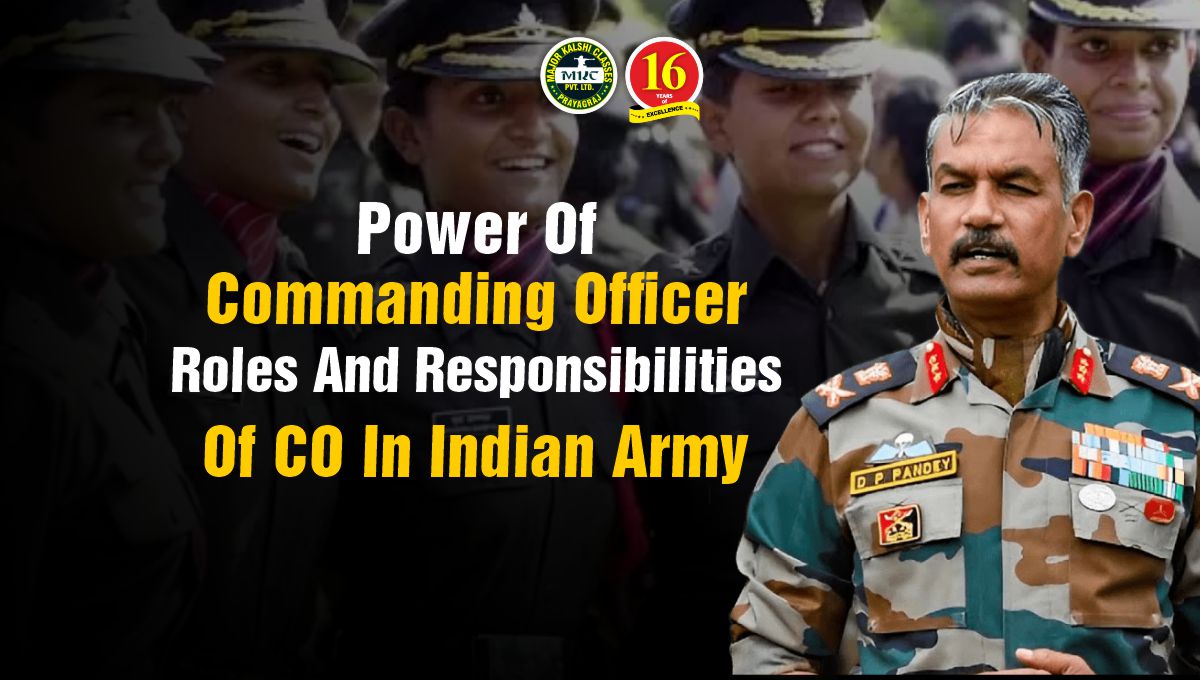Power of Commanding Officer | Roles and Responsibilities of CO in Indian Army
Power of Commanding Officer :- In the military and various other organizations, the role of a Commanding Officer (CO) holds immense significance. The Commanding Officer is entrusted with substantial power, responsibilities, and authority, all of which are crucial in shaping the efficiency, morale, and success of the unit or organization they lead. This article explores the power of a Commanding Officer, delving into their roles and responsibilities that contribute to effective leadership and the accomplishment of objectives.
Power of Commanding Officer
Table of Contents
The Commanding Officer, often referred to as the “CO,” is the individual appointed to lead and command a military unit, ship, squadron, or any other organization. Whether it’s a naval vessel, an army battalion, an air force squadron, or even a civilian institution, the CO’s role is vital in maintaining discipline, order, and unity among the team members.
Authority and Power:
One of the most significant attributes of a Commanding Officer is their authority and power over the unit or organization they command. The CO’s authority is derived from their position, and it is essential for ensuring efficient decision-making and execution of orders. This authority empowers the CO to make critical decisions, allocate resources, and direct the unit towards achieving its objectives.
Responsibilities of a Commanding Officer:
The responsibilities of a Commanding Officer are diverse and far-reaching. They extend beyond just giving orders; instead, they encompass fostering a cohesive and disciplined environment that promotes teamwork and enhances the unit’s capabilities. Some of the key responsibilities of a Commanding Officer include:
- Mission Accomplishment: The primary responsibility of a Commanding Officer is to ensure the successful accomplishment of the unit’s assigned mission or objectives. They are responsible for devising strategies, setting goals, and providing guidance to subordinates to achieve the desired outcomes.
- Personnel Management: The CO is entrusted with the welfare and professional development of the personnel under their command. They must ensure proper training, mentorship, and support for their subordinates, fostering a positive work environment that encourages growth and camaraderie.
- Discipline and Order: Maintaining discipline and order within the unit is critical for operational success. The Commanding Officer sets the standards for behavior, professionalism, and adherence to protocols, instilling a sense of pride and loyalty among the team members.
- Resource Management: The CO is responsible for the efficient allocation and utilization of resources available to the unit. This includes financial resources, equipment, manpower, and time management to optimize operational effectiveness.
- Decision-making: Commanding Officers are frequently faced with complex and high-stakes decisions. They must analyze situations, assess risks, and make timely and informed choices that align with the organization’s objectives and the welfare of its members.
- Communication: Effective communication is paramount for successful leadership. The CO must ensure clear and concise communication of orders, expectations, and information throughout the unit, enabling a smooth flow of operations and understanding among team members.
- Accountability: Commanding Officers are ultimately accountable for the actions and performance of their unit. They must take responsibility for both successes and failures, learn from experiences, and implement necessary improvements to enhance future outcomes.
Leadership and Legacy:
A Commanding Officer’s leadership style and approach can profoundly impact the unit’s culture and effectiveness. A successful CO fosters a sense of loyalty, respect, and admiration among the team, encouraging them to go above and beyond their call of duty. A positive legacy created by a strong and inspiring Commanding Officer can endure for generations, shaping the organization’s traditions and values.
The Commanding Officer’s position carries immense power, responsibilities, and opportunities to lead and inspire others. Their role is instrumental in accomplishing the unit’s missions, nurturing the professional growth of subordinates, and maintaining the highest standards of discipline and order. Effective leadership by a Commanding Officer not only drives operational success but also leaves a lasting impact on the organization’s culture and its members’ lives. It is a position of great honor and responsibility, and those who assume the role must be prepared to lead with integrity, dedication, and a commitment to excellence.








